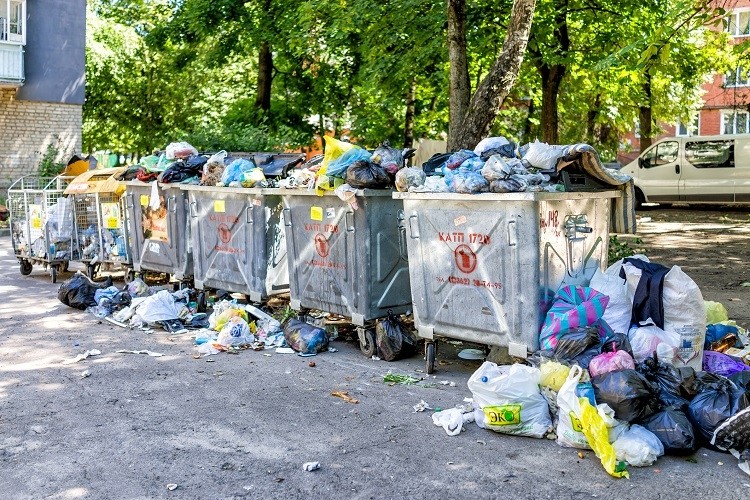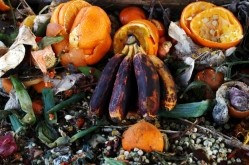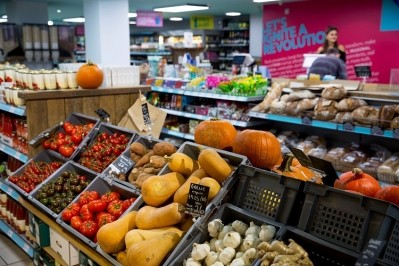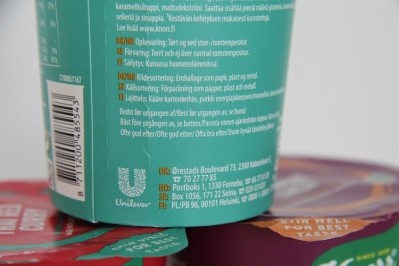Is retail food waste driven by top-down policy? ‘Ethical conduct should come before maximising profits’

Food waste is problematic for a whole host of reasons. Ethically, the concept of wasting food, while food insecurity levels rise around the world, is hard to swallow. Environmentally, the planet’s limited resources – such as land and water – are used to produce food, and carbon dioxide emitted during the production process.
And from a financial perspective, food waste does not make a strong business case. The United Nationals estimates 1.3bn tonnes of food is lost or wasted each year, equating to approximately one-third of the food produced for human consumption. Food loss and waste amounts to roughly €592bn per year in industrialised countries.
Although figures are slightly better in the EU, a hefty 20% of total food produced across the bloc is wasted per annum.
A majority of this food waste occurs in the home (53%), with a non-negligible 5% attributed to wholesale and retail sectors.
While the grocery sector is dominated by supermarket chains, to tell the entire retail waste story alternative food networks (AFNs), such as consumer food cooperatives, must be included in the narrative.
A team of researchers from the Netherlands and Poland are looking beyond the profit-focused multinationals to small-scale, independent and alternative retail models to do just that.
Filling a food waste ‘knowledge gap’
The research was prompted by an observation that much less is understood about food waste in AFNs – a concept that has developed in Europe and around the world – than in conventional supermarkets.
“On one hand, there is more and more attention to food waste in retail, and on the other hand, there have been calls for more research on the environmental benefits and impacts of alternative food networks,” said lead researcher Ana Poças Ribeiro from Utrecht’s Copernicus Institute for Sustainable Development.
Definitions for AFNs are far-reaching, but the term usually implies organising food provisions in a different way to the typical conventional system – i.e. buying food from supermarkets that are supplied by wholesalers, Poças Ribeiro explained.
AFN models often mean that the number of intermediaries between farms and consumers are reduced, and that local or regional small-scale farmers producing through organic methods are supported.
“Other themes associated to AFNs are the importance given to food quality, often deemed superior than conventionally obtained food, and the embedding of food in social relationships between consumers and farmers, but also between consumers who organise some of the AFNs,” she told FoodNavigator.
Together with researchers based in Utrecht and at the University of Warsaw, Poças Ribeiro conducted a case study on a consumer food cooperative in Poland – a country with one of the highest levels of food waste per capita in the EU.
The non-profit Raven Food Co-op was first established in 2013, and has since expanded to two locations within Warsaw. The ‘bottom-up’ initiative aims to provide a practical middle-ground between what is perceived as low-quality products from supermarkets, and expensive organic stores.
“Looking at how food waste is prevented and managed in a food co-op with two shops, and comparing it to descriptions of food waste in conventional retail, seemed like a good opportunity to make a connection between both fields,” explained the study lead.
Comparing alternative to conventional retail
The study aimed to answer three questions: what are the levels of food waste in the AFN? What are the food waste causes in the AFN? And what are the food waste management strategies in the AFN?
To do so, the researchers were granted access to Raven’s datasets, and interviewed the co-op’s shop manager and purchasing coordinator.
The study found that in terms of physical units, 1.09% of the total volume of food sales is wasted at Raven. Whereas at conventional retail stores, it has previously been estimated that between 1-2% of total food waste by mass, across all categories, is wasted.
“The food waste levels found in the food co-op of our case-study were low,” Poças Ribeiro told this publication, "particularly taking into account that, one, these values are overestimated, as unsold products are officially counted as food waste, but still informally redistributed when still edible; and, two, that these low values were achieved in the context of a high share of fresh product, which is more prone to waste".
While the exact reasons for lower values was difficult to assess, as many factors influence food waste, the researcher did note that the AFN had a higher degree of autonomy and more freedom to prevent and handle food waste.
Further, Raven’s policies differed from those of conventional retail stores, which are mainly driven by maximising profit. This may mean that there is greater focus on cost, policies reject products with less than 70% of their shelf life left, or managers are warned against giving food away to employees – all factors that can contribute to food waste.
Conversely, Raven is founded on a bottom-up approach that looks beyond profit. Its key drivers are to ‘balance viability, accessibility and ethical guidelines’.
“Even when food waste occurred the co-op had a system in place, in which the food waste would be collected by one of their suppliers – an organic farmer – or by a local permaculture gardener,” the study lead explained.
Indeed, the researchers found that preventing food waste as much as possible was of ‘high concern’ in the co-op, even if it meant losing money.
“The prices are discounted once products become less fresh, or close to [their] best before date, and the co-op members and normal clients are actively reminded about it. Once products are no longer saleable but still edible they are informally redistributed among the co-op members, employees and clients,” Poças Ribeiro explained.
“The fact that the co-op is a non-profit association makes it easier for them to have values higher than profit, while not disregarding the financial health of the organisation.”

As this case study does not offer findings for the entire AFN sector, the researchers are pushing for additional investigations into other retail AFNs, in small-scale conventional and organic retail, as well as in small and large-scale cooperative supermarkets.
“Future research can build on our approach of combining food waste estimations with qualitative investigation of food waste causes and management practices,” noted the study authors.
What does this mean for policymakers?
Poças Ribeiro suggested policymakers could leverage this research to help reduce food waste at retail level.
“On one hand, policymakers can make it easier for retailers not to be liable for food that they do not sell, but which is still edible, so it could go for charities as it already happens in some cases,” she told this publication.
“On the other hand, policymakers could find ways to prevent retailers from disposing still edible food, as food waste involves environmental costs, and is ethically questionable.”
The researcher continued: “Food that can still be eaten should be made available for free to employees and customers instead of disposed in the garbage. This would reduce environmental costs and stop the unethical practice of disposing of edible food.”
And the retail sector?
For Poças Ribeiro, food retailers are in conflict between achieving corporate social responsibility (CSR) targets and “the search for maximising profits”. Her research to date indicates that many aspects contribute to food waste in retail, including a top-down approach to policy.
“The push that store managers feel from higher management for maximising profits is a key aspect. If food retailers want to seriously reduce and prevent food waste, there are many things they can do.”
For one, retailers could begin by acknowledging that disposing of still edible food is ethically questionable, she argued.
“If food waste is taken seriously, retailers can improve their image by making it easier for employees and customers to take edible products that are no longer saleable, even if it affects part of the profits. An ethical conduct should come before maximising profits, and companies that would sincerely address it would probably see positive marketing.”
Source: Resources, Conservation and Recycling
‘Food waste in an alternative food network – A case-study’
Published online 7 June 2019
DOI: https://doi.org/10.1016/j.resconrec.2019.05.029
Authors: Ana Poças Ribeiro, Jakub Rok, Robert Harmsen, Jesús Rosales Carreón, Ernst Worrell



















